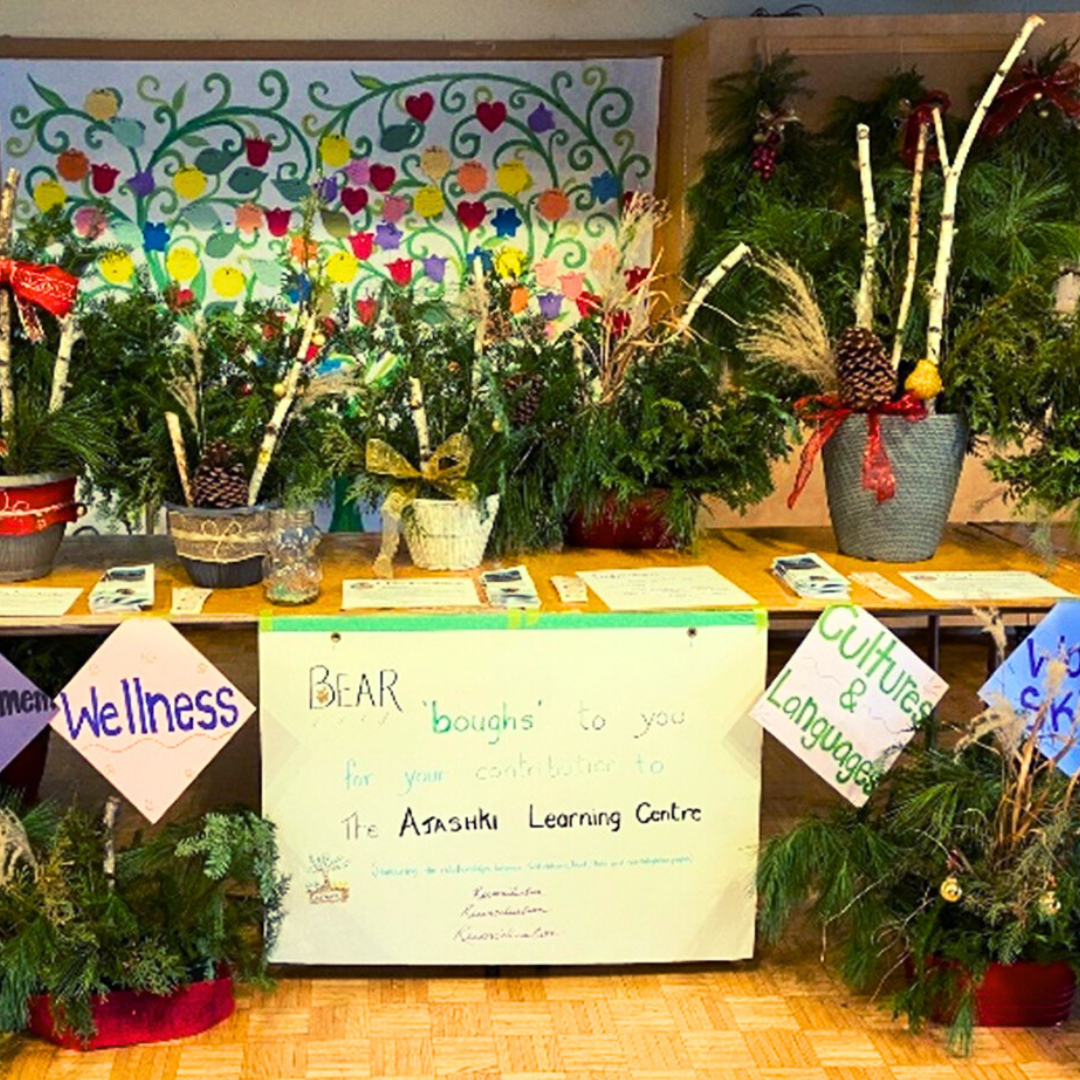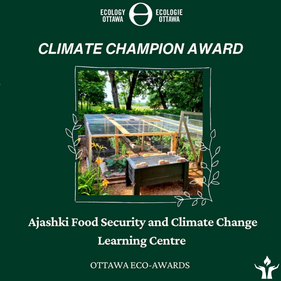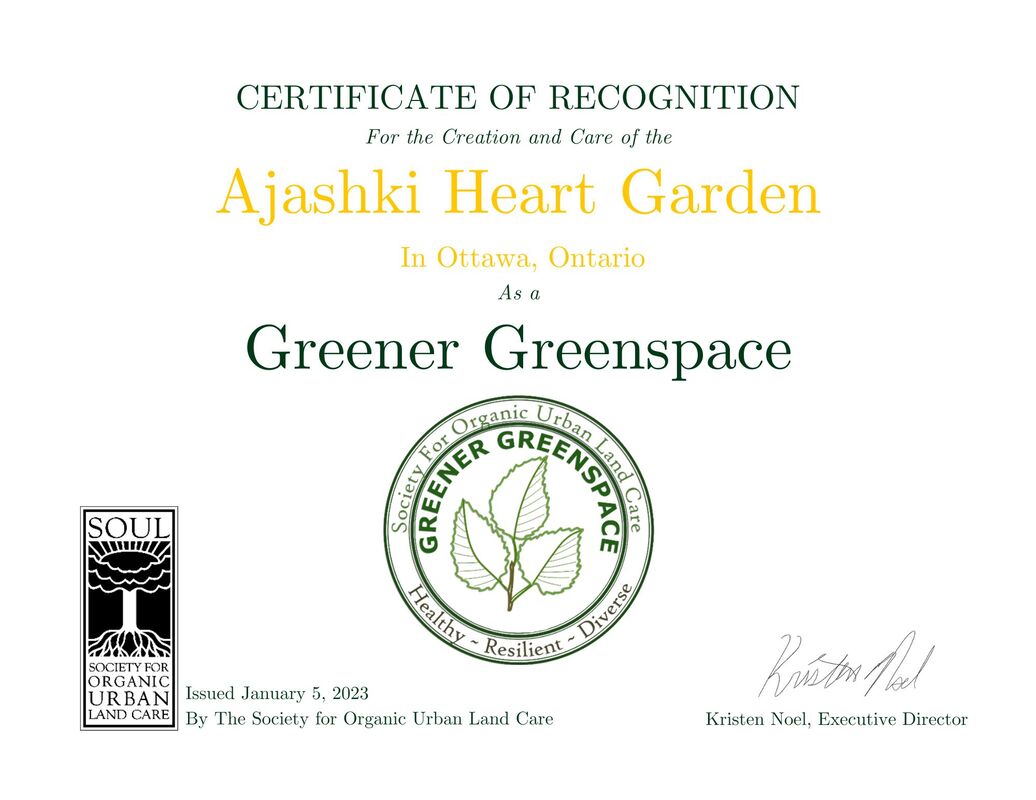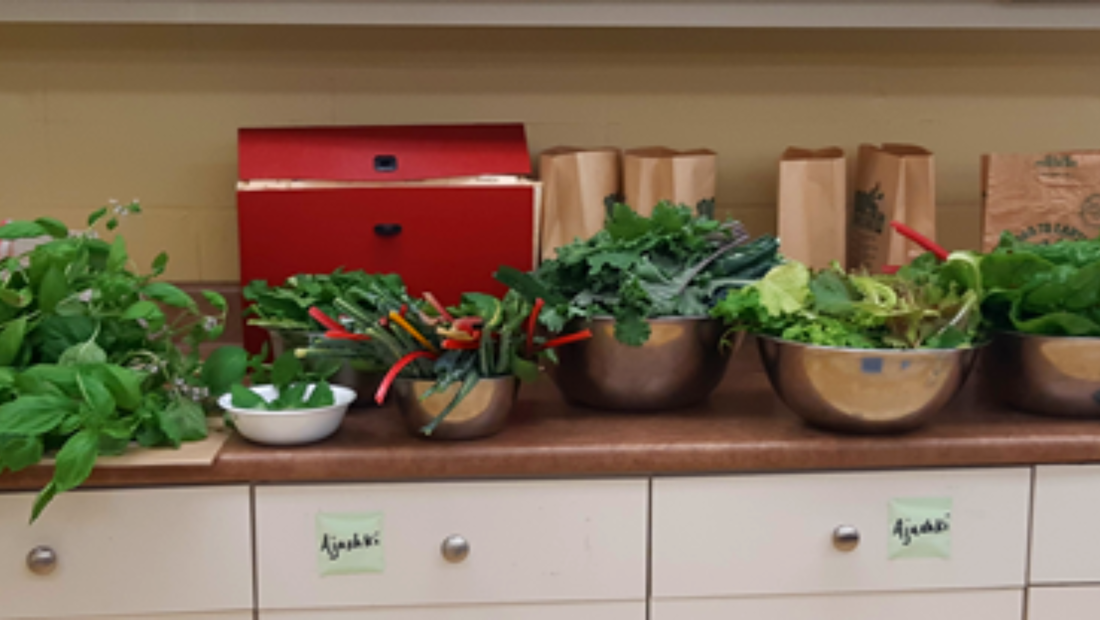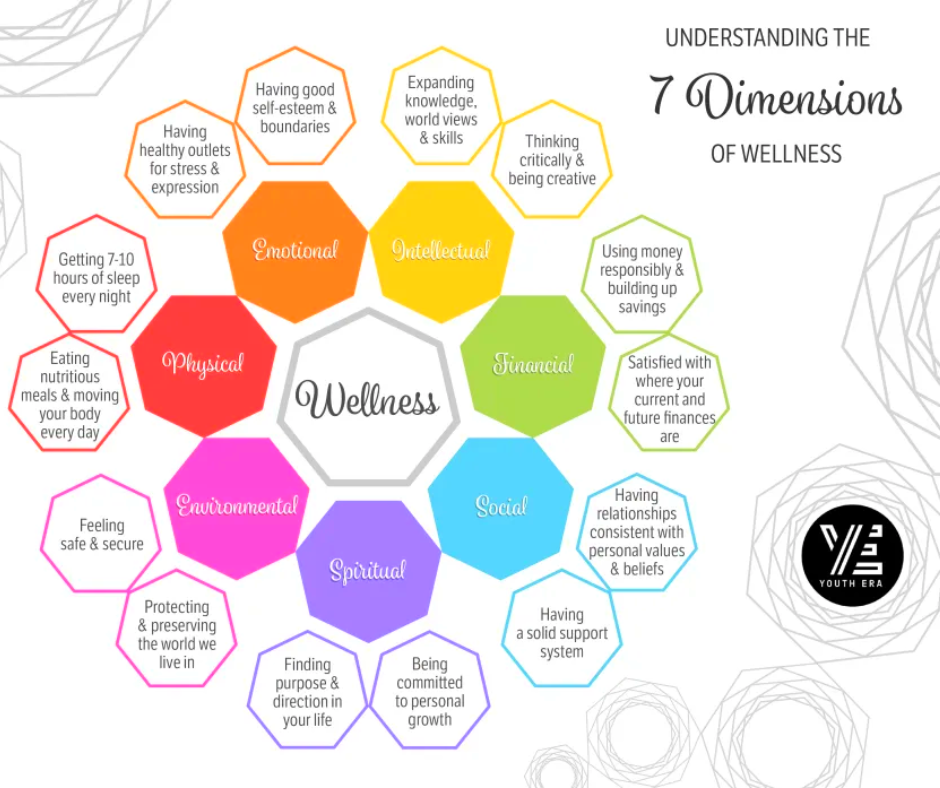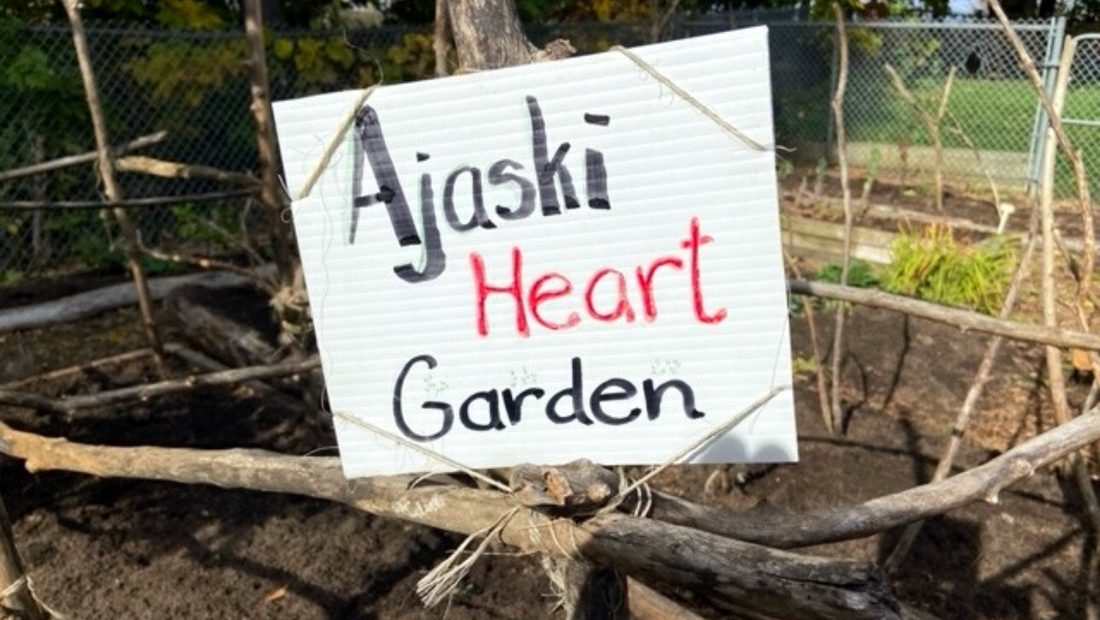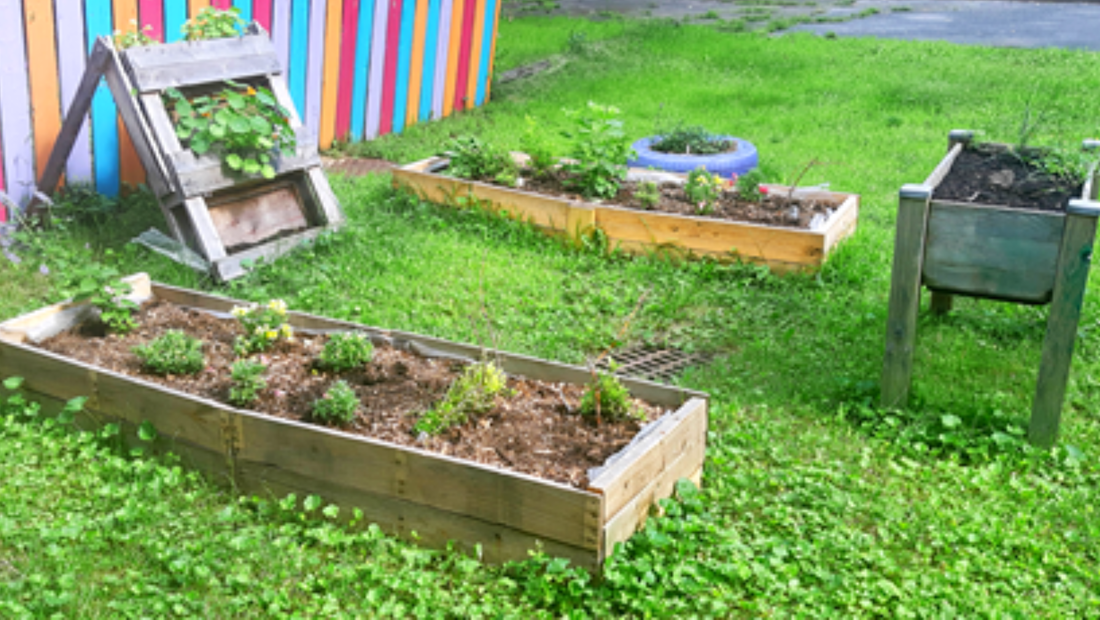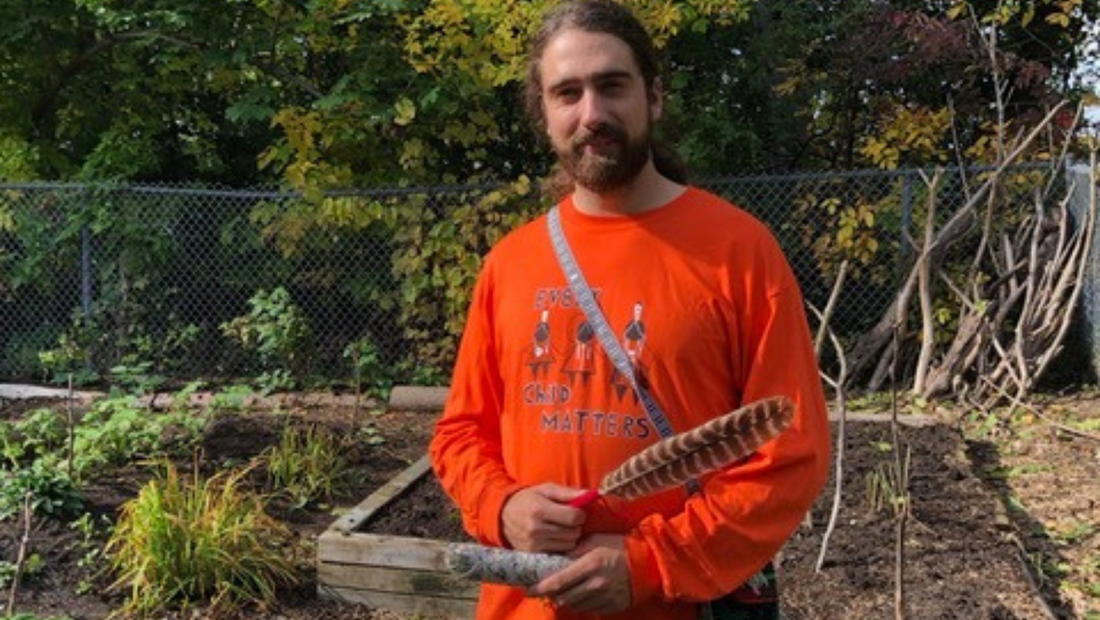
Ajashki is FirstU’s response to the Truth and Reconciliation Commission’s Call to Action, the United Nations’ Sustainable Development Goal #2 to
end poverty, and UNDRIP’s effort to reduce systemic racism. The Ajashki Food Security and Climate Change Learning Centre wants to harness the potential of youth leaders by offering paid employment while promoting access to Indigenous language and culture related to ancestral gardening practices. The Ajashki "HEART" Garden Project gratefully acknowledges the support of the Ottawa Community Foundation, the Parkdale Food centre, Growing Futures and Mino-Wessini.
end poverty, and UNDRIP’s effort to reduce systemic racism. The Ajashki Food Security and Climate Change Learning Centre wants to harness the potential of youth leaders by offering paid employment while promoting access to Indigenous language and culture related to ancestral gardening practices. The Ajashki "HEART" Garden Project gratefully acknowledges the support of the Ottawa Community Foundation, the Parkdale Food centre, Growing Futures and Mino-Wessini.
help us grow!
Want to support Ajashki's efforts in food security and education? We invite you or your business or organization to become a Monthly Donor. You will be welcomed to our garden gatherings and receive regular updates. Click HERE for how to donate on a monthly or one-time basis.
Questions? Please send us a note at: [email protected]
Questions? Please send us a note at: [email protected]
What's Growing on with Ajashki - March 2024
|
By Kayoki Whiteduck
As we move into our fourth year, Ajashki has made some changes. What started out as a special reconciliation project with FirstU, has evolved into a reconciliation program at FirstU. We appreciate this growing confidence in and support for Ajashki shown by the FirstU leadership and the congregation. We now have biweekly meetings with FirstU staff, Jen, Michelle and Rev. Eric, and our board liaison, Guy Belleperche, to keep everyone in the loop and to share ideas. We also have more structure around our Circle of Support volunteers. Each volunteer now has a formal position based on their interest: · Sharen Bowen, Reconciliation Coordinator; · Lynn Kofmel-Preston, Makerspace Coordinator; · Patti Wunsch, Construction Coordinator; · Meghan Dunn, Food Coordinator; and · Jan Andrews, Finance Coordinator. This structure has been useful in helping people to understand what each volunteer's role is at Ajashki. We would also like to say a kitchi meegwetch (big thank you) to Guy Belleperche who recently volunteered to be our board liaison. |
Something that is new at Ajashki this winter is the makerspace. The idea behind the makerspace is to teach participants, or Future Food Warriors (FFWs) as we call them, about entrepreneurship, making useful and practical products and learning new skills. Led by our incredibly skilled Makerspace Coordinator Lynn Kofmel-Preston, we teach FFWs how to make products people may be interested in buying. Some of our first items created in the makerspace were decorative holiday planters and boughs, which we almost completely sold out of before the holiday season. They were an instant hit!
The next thing we started working on were knitted items such as dish cloths and scarves. We also were lucky enough to have Tess Frost volunteer some of her time to show us how to stick weave. Afterwards, we decided we could make headbands and guitar straps with this process.
As we continue our journey with the makerspace, we are looking for more eco-friendly products to make, related to the themes of gardening and climate change. Keep an eye out for Ajashki makerspace products for sale coming soon.
The grow towers are back! After a short hiatus and a real good cleaning, the grow towers are up and growing again. We have planted lettuce, Swiss chard, arugula and everyone's favourite…kale! Most are still small seedlings, so it will be a few weeks until they are ready. An announcement will be made when the greens are available after the Sunday service.
With an annual budget of $100,000, Ajashki survives mostly on grants, for which we apply regularly. FirstU has generously committed $10,000 this year towards Ajashki (plus their in-kind contributions of space and administrative support), and we have a few dedicated financial supporters, some of whom contribute monthly. Meegwetch/Thank you!
The next thing we started working on were knitted items such as dish cloths and scarves. We also were lucky enough to have Tess Frost volunteer some of her time to show us how to stick weave. Afterwards, we decided we could make headbands and guitar straps with this process.
As we continue our journey with the makerspace, we are looking for more eco-friendly products to make, related to the themes of gardening and climate change. Keep an eye out for Ajashki makerspace products for sale coming soon.
The grow towers are back! After a short hiatus and a real good cleaning, the grow towers are up and growing again. We have planted lettuce, Swiss chard, arugula and everyone's favourite…kale! Most are still small seedlings, so it will be a few weeks until they are ready. An announcement will be made when the greens are available after the Sunday service.
With an annual budget of $100,000, Ajashki survives mostly on grants, for which we apply regularly. FirstU has generously committed $10,000 this year towards Ajashki (plus their in-kind contributions of space and administrative support), and we have a few dedicated financial supporters, some of whom contribute monthly. Meegwetch/Thank you!
ajashki in the NEWS!
|
For the first time this year, Ecology Ottawa, the city's leading environmental organization, offered a series of ECO AWARDS. We're so pleased to announce that the Ajashki Food Security and Climate Change Learning Centre has been recognized with a Climate Champion Award! Read about all the award winners HERE.
"First Unitarian Congregation of Ottawa is showing strong leadership by supporting the Ajashki Food Security and Climate Change Learning Centre conceived by Elder Verna McGregor. This Special Reconciliation Project will now expand to include the Ontario Aboriginal Housing Service in a Land Back Initiative so they can build Affordable Housing for Indigenous People on this Campus beside Ajashki." ~ Community Member |
|
Ajashki Garden Project Recognized by SOUL!
We’re excited to announce that the Ajashki Garden Project has received a Greener Greenspace award from the Society for Organic Urban Landcare (SOUL)! The project was particularly recognized for its use of urban space as a tool to educate youth on food security, as well as by the impressive transformation of the site in just 24 months! Kayoki Whiteduck, the Ajashki Gardener, has offered to present at SOUL's upcoming Greener Green Spaces webinar series. 
New Look for Ajashki
Check out our new logo, designed by Kayoki and one of our youth participants (left). |
Ajashki Recognized in the National Observer
"When a Unitarian congregation in Ottawa’s West End neighbourhood wanted to advance reconciliation in their community, they took the advice of Verna McGregor, an Elder from Kitigan Zibi Anishinabeg, who suggested they start an Indigenous learning centre." Click HERE to read the rest of the article.
CUC Profile on the Ajashki Garden Project
We are delighted to announce that the CUC has done a profile piece on the Ajashki Garden Project. Click HERE to read the profile piece.
"When a Unitarian congregation in Ottawa’s West End neighbourhood wanted to advance reconciliation in their community, they took the advice of Verna McGregor, an Elder from Kitigan Zibi Anishinabeg, who suggested they start an Indigenous learning centre." Click HERE to read the rest of the article.
CUC Profile on the Ajashki Garden Project
We are delighted to announce that the CUC has done a profile piece on the Ajashki Garden Project. Click HERE to read the profile piece.
|
Harvest Fresh Greens on Sunday!
The Ajashki project has an indoor garden located in the Volunteer Room, which is growing lettuce, chard, kale and basil. We would love to share the harvest with the congregation. A volunteer will be available after the Sunday service to demonstrate how to harvest without damaging the plants. Please bring a re-usable container for your greens. |
Getting Back to the Garden with Ajashki
In 2020, the Board of the First Unitarian Congregation of Ottawa approved support for AJASHKI, a Community Agriculture, Food Security, Urban, Low-income Youth Pilot Project initiated on campus land. It is one response to the acknowledgement that the Campus rests on unceded, unsurrendered, Algonquin Anishinaabeg Territory and also a response to the Truth and Reconciliation Report’s call to create Indigenous-led youth programs.
The name Ajashki, Algonquin for “soil”, was chosen for this project because soil is the vital element of any garden. In fact, the quality of soil impacts all species. The soil is also a symbol of where we begin to grow as people and as community. Reconciliation requires that we open ourselves to learning about other people and cultures. This project will provide such opportunities. |
In 2021, we began with two youth participants (Future Food Warriors) in a successful pilot operating one day per week during the summer and winter, with the winter program focused on education and food production using growing towers. This year, the summer program has expanded to two days per week with up to 8 Future Food Warriors, primarily from Indigenous communities (First Nation, Metis, Inuit, and one non-Indigenous). We have expanded to include the 7 grandfather teachings on wellness by integrating the Seven Dimensions of Wellness model into the curriculum
215 Marigolds planted to honour children who died in residential schools
Kakitigejik
The Gardener
Kayoki Whiteduck
Kayoki is a young Algonquin Anishinabe farmer from Kitigan Zibi. He is a young man with a vision to teach other Indigenous youth how to grow their own food, in an effort to address food insecurity in urban First Nation communities. Kayoki is a strong advocate for sustainable, regenerative permaculture, farming and gardening practices. He has received a Certificate in Horticulture from Camosun College in Victoria, B.C. and has studied Western Herbalism at the International Academy of Health Sciences in Ottawa. Kayoki is the first Indigenous person to be selected to the Canadian Agriculture Youth Council (CAYC). He was recently chosen to co-chair the CAYC's Climate Change Initiative. This past April, Kayoki was FirstU’s Youth Delegate to the UN Intergenerational Conference: All in for Climate Justice, Food Equity and Sustainability. Kayoki grows and markets teas from plants that he cultivates, or harvests from tended wild areas.
Kayoki has an inherent understanding of the interconnectedness of the natural world. He cares deeply about fostering the interaction of people with nature and people with each other. He supports participants to accept differences and recognize shared values, ideas, goals, and experiences and leads them to better understand themselves and others while showing them the possibilities in food production and an understanding of the importance of caring for the earth.
Kayoki and the Future Food Warriors are onsite for two days a week, working in the garden and engaging in structured learning about plant identification, local wild sources of food, sustainable soil amendment and plant care practices, climate effects on food production, and harvest and food sharing. Through skills development, the potential for future youth leaders will be developed, and participants will be introduced to the possibilities of future employment in agriculture while enjoying a shared harvest.
The Gardener
Kayoki Whiteduck
Kayoki is a young Algonquin Anishinabe farmer from Kitigan Zibi. He is a young man with a vision to teach other Indigenous youth how to grow their own food, in an effort to address food insecurity in urban First Nation communities. Kayoki is a strong advocate for sustainable, regenerative permaculture, farming and gardening practices. He has received a Certificate in Horticulture from Camosun College in Victoria, B.C. and has studied Western Herbalism at the International Academy of Health Sciences in Ottawa. Kayoki is the first Indigenous person to be selected to the Canadian Agriculture Youth Council (CAYC). He was recently chosen to co-chair the CAYC's Climate Change Initiative. This past April, Kayoki was FirstU’s Youth Delegate to the UN Intergenerational Conference: All in for Climate Justice, Food Equity and Sustainability. Kayoki grows and markets teas from plants that he cultivates, or harvests from tended wild areas.
Kayoki has an inherent understanding of the interconnectedness of the natural world. He cares deeply about fostering the interaction of people with nature and people with each other. He supports participants to accept differences and recognize shared values, ideas, goals, and experiences and leads them to better understand themselves and others while showing them the possibilities in food production and an understanding of the importance of caring for the earth.
Kayoki and the Future Food Warriors are onsite for two days a week, working in the garden and engaging in structured learning about plant identification, local wild sources of food, sustainable soil amendment and plant care practices, climate effects on food production, and harvest and food sharing. Through skills development, the potential for future youth leaders will be developed, and participants will be introduced to the possibilities of future employment in agriculture while enjoying a shared harvest.
Kitigan
The Garden
The Ajashki Circle of Support has registered two "Heart Gardens" with First Nations Child and Family Care Society. These "Heart Gardens" are designed to honour the 215 children found in unmarked graves on the Kamloops Indian Residential School land. A Youth "Heart Garden" was created in 2021 and a Child and Family "Heart Garden" has been created in 2022.
The Garden
The Ajashki Circle of Support has registered two "Heart Gardens" with First Nations Child and Family Care Society. These "Heart Gardens" are designed to honour the 215 children found in unmarked graves on the Kamloops Indian Residential School land. A Youth "Heart Garden" was created in 2021 and a Child and Family "Heart Garden" has been created in 2022.
Dashan Pimosen Kitiganing
Come Walk in the Garden
For a congregation seeking a Green Sanctuary Accreditation, Ajashki fulfills the accreditation requirements for working with traditionally marginalized communities in our area. It is one of many actions being taken by the FirstU community to recognize our responsibility for environmental and climate justice. Ajashki helps us to respond in practical, functional and caring ways, greening the campus, learning to appreciate what is already there, promoting understanding across cultures and helping to prepare youth to face personal and community challenges.
Ajashki invites everyone to come walk in the garden and delight in the bounty that nature provides.
Come Walk in the Garden
For a congregation seeking a Green Sanctuary Accreditation, Ajashki fulfills the accreditation requirements for working with traditionally marginalized communities in our area. It is one of many actions being taken by the FirstU community to recognize our responsibility for environmental and climate justice. Ajashki helps us to respond in practical, functional and caring ways, greening the campus, learning to appreciate what is already there, promoting understanding across cultures and helping to prepare youth to face personal and community challenges.
Ajashki invites everyone to come walk in the garden and delight in the bounty that nature provides.

